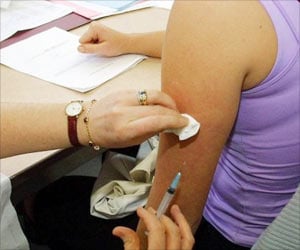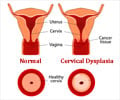- Cervical cancer is the second most common type of cancer among women in India and accounts for nearly one-fourth of the world’s cervical cancer deaths
- Approximately 453 million women aged 15 and older are at risk of acquiring cervical cancer
- Regular screening and HPV vaccine can prevent the cancer
Read More..
International Federation of Gynecologists and Obstetricians (FIGO), Asia Oceania Research Organization on Genital Infections and Neoplasia (AOGIN-India), Indian Society of Colposcopy and Cervical Pathology (ISCCP), and Association of Gynecologic Oncologists of India (AGOI) collaborated to organize the meeting.
Human Papilloma Virus (HPV) infection leads to cervical cancer in around 120,000 Indian women every year killing more than 77,000 deaths. Indian women age 15 and older who are at risk of acquiring cervical cancer number around 453 million.
Dr. Shantha Kumari, President of FOGSI, said during the Expert Group Meeting on Cervical Cancer: "So much morbidity and mortality due to cervical cancer is unnecessary. Cervical cancer develops 10 to 20 years after mild dysplasia first appears. The disease is completely avoidable because of its slow progression. Regular screening is required to identify pre-cancerous lesions, early diagnosis and prompt treatment to stop their development into cancer. However, screening alone is insufficient. We also demand that the HPV vaccine be widely administered.”
She further added. “If administered to women and girls before they are exposed to the virus, this can prevent the majority of incidences of cervical cancer as well as other malignancies brought on by HPV. We at FOGSI and other like-minded organizations would like to see the HPV vaccine included in the National Program by the Government of India.”
Dr. Neerja Bhatla, Head, Department of Obstetrics & Gynecology, AIIMS, New Delhi, stated in her welcome speech. “India is now on its road to universalizing the national-level HPV vaccination programme to prevent cervical cancer.” After executing a sizable multi-centric trial, the HPV vaccine CERVAVAC, (5) manufactured in India was released. It is regarded as inexpensive, safe, and highly effective. In order to achieve widespread cervical-cancer screening, efforts are also being made to create an affordable point-of-care indigenous HPV test. With this, there is renewed hope for India's efforts to eradicate cervical cancer quickly.”
Famous gynecologist Dr. Usha Saraiya said during the occasion that Prof. VK Paul from NITI Aayog and Union Health Secretary Rajesh Bhushan's attendance demonstrated the government's support and will to eradicate cervical cancer.
“The organizations who participated in this Expert Group Meeting have been working tirelessly for the prevention and control of cervical cancer,” said Dr. CN Purandare, a former president of FOGSI. He added that these initiatives have been greatly increased during the past two years in accordance with the WHO Call for Action. By setting specific goals for 2030, the WHO has provided a global strategy to end cervical cancer. These goals include immunizing 90% of girls by the age of 15, screening 70% of women with an efficient test like HPV, and treating 90% of precancerous and cancerous lesions (1✔ ✔Trusted Source
Cervical cancer kills 77,000 women in India each year. Include HPV vaccine in National Program: FOGSI
Go to source, 2✔ ✔Trusted Source
Cervical cancer claims more than 77,000 lives every year, include HPV vaccine in National Program: FOGSI
Go to source, 3✔ ✔Trusted Source
Indian doctors develop low-cost screening for cervical cancer
Go to source, 4✔ ✔Trusted Source
Cervical Cancer Kills Over 77K Indian Women Every Year: FOGSI
Go to source).
Dr Rajesh Gokhale, Secretary, DBT said, this is a celebration of collective efforts of all stakeholders and added that partnerships with industries are becoming incredibly important for doing R&D, which requires huge funding. He said, India will take a lead in vaccine development and medicine by breaking all barriers for betterment of mankind.
Dr N. Kalaiselvi, DG, CSIR in her address said that the cancer vaccine will help Indian women and women across the globe in major way and we may see in near future the version 1, 2 and 3 of “CERVAVAC”, as technologies are short lived. She said, “India Can Do” and added that we will come out with Indian solutions to Indian problems in true spirit of Atmanirbhar Bharat.
Mr. Adar C. Poonawalla, CEO, Serum Institute of India, Pune said in his brief address said that well being and protection of mother and child is the core philosophy of Serum Institute as only a healthy India can be a productive India. He also supported DBT’s vision for more collaboration between Private and Government sectors for manufacturing of vaccines and drugs in India.
Noted film actress Manisha Koirala, who bravely fought and won the battle against ovarian cancer joined virtually to thank the Ministry of Science and Technology and particularly DBT for reaching this milestone. She said, this a great day for women in India and women world over, as there is life beyond cancer. She said, cost effective preventive treatment will inspire millions of such patients to say “Yes to Life.”
Dr. Alka Sharma, Senior Adviser, DBT and MD, BIRAC gave the welcome address, while Dr Shirshendu Mukherjee, Mission Director, Grand Challenges India and In-Charge, Mission COVID Suraksha, BIRAC delivered the vote of thanks.
Dr. Neerja Bhatla, Prof., Gynaecology and Obstetrics, AIIMS, New Delhi, Dr. N. K. Arora, INCLEN Trust, New Delhi, Dr. Umesh Shaligram, Executive Director, Serum Institute of India, Pune, Dr. Guruprasad R. Medigeshi, Asst. Prof., THSTI, Faridabad, Dr. Devasena Anantharaman, Scientist, RGCB, Thiruvananthapuram also took part in the event.
CERVAVAC
CERVAVAC is a vaccine for prevention of cervical cancer which is indigenously manufactured. Dr. Jitendra Singh, Union Minister of State (Independent Charge) for Science and Technology, Minister of State (Independent Charge) for Earth Sciences, and Minister of State (PMO), Personnel, Public Grievances, Pensions, Atomic Energy, and Space announced the development of India's first indigenous vaccine ‘CERVAVAC’ for the prevention of cervical cancer.Dr. Jitendra Singh said, “This affordable and cost-effective vaccine marks an important day for DBT and BIRAC as it takes India a step closer to PM Modi's vision of Atmanirbhar Bharat.” He made the announcement in the presence of Mr. Adar C. Poonawalla, CEO, Serum Institute of India, Pune, and other notable scientists and dignitaries.
He emphasized that despite being mostly avoidable, cervical cancer ranks as the second most common malignancy in India and is responsible for roughly one-fourth of all cervical cancer fatalities worldwide. He said that according to current statistics, over 75,000 women in India die from the disease each year and 1.25 lakh women are diagnosed with cervical cancer. He further claimed that HPVs 16 or 18 are responsible for 83% of invasive cervical cancer cases in India and 70% of cases globally. The Minister stated that vaccination against the human papillomavirus is the most effective method for avoiding cervical cancer (HPV) (5✔ ✔Trusted Source
"CERVAVAC" for the prevention of cervical cancer
Go to source).
Indian Women can be SAVED
In addition to creating and putting into place a successful cervical cancer screening and prevention programme, India needs to keep up its active research in the areas of identifying all potential risk factors and ways to reduce them. The current National Non-communicable Disease Prevention and Control Program could aid in reducing the morbidity and death linked to this avoidable malignancy by raising awareness about cervical cancer prevention and treatment (6✔ ✔Trusted SourceProfile of cervical cancer patients attending Tertiary Care Hospitals of Mangalore, Karnataka: A 4 year retrospective study
Go to source).
References
- Cervical cancer kills 77,000 women in India each year. Include HPV vaccine in National Program: FOGSI - (https://www.punekarnews.in/cervical-cancer-kills-77000-women-in-india-each-year-include-hpv-vaccine-in-national-program-fogsi/)
- Cervical cancer claims more than 77,000 lives every year, include HPV vaccine in National Program: FOGSI - (https://timesofindia.indiatimes.com/life-style/health-fitness/health-news/cervical-cancer-claims-more-than-77000-lives-every-year-include-hpv-vaccine-in-national-program-fogsi/articleshow/94931719.cms?)
- Indian doctors develop low-cost screening for cervical cancer - (https://economictimes.indiatimes.com/industry/healthcare/biotech/healthcare/indian-doctors-develop-low-cost-screening-for-cervical-cancer/articleshow/20412244.cms?from=mdr)
- Cervical Cancer Kills Over 77K Indian Women Every Year: FOGSI - (https://www.hercircle.in/engage/get-inspired/trending/cervical-cancer-kills-over-77k-indian-women-every-year-fogsi-3664.html)
- “CERVAVAC” for the prevention of cervical cancer - (https://pib.gov.in/PressReleasePage.aspx?PRID=1856034)
- Profile of cervical cancer patients attending Tertiary Care Hospitals of Mangalore, Karnataka: A 4 year retrospective study - (https://www.ncbi.nlm.nih.gov/pmc/articles/PMC5320814/)
Source-Medindia















